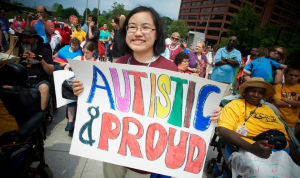
An essay by disability rights activist Lydia Brown (COL ’15) is on the
syllabus for new anthropology course “Disability and Culture.”
An anthology featuring an essay by Lydia Brown (COL ’15), a student activist for disability rights, will be used as coursework in a new anthropology course called “Disability and Culture,” taught by Professor Sylvia Onder. The anthology, titled “Criptiques,” is a collection of works by disabled writers, “exploring the provocative sides of disability,” according to the publication’s website.
“This is one of relatively few collective pieces of literature exploring a variety of issues in madness and disability in very radical ways that have not frequently been brought together in conversation,” Brown said.
Brown’s essay, “Disability in an Ablelist World,” the first essay Onder assigned her class from the anthology, aims to move beyond the dichotomy between the models of disability as both a medical condition and as a social construct, arguing instead that disability is both biologically embodied and cultural constructed.
“As much as disability is a lived reality in people’s bodies, it is also equally, or just as much, social and cultural,” Brown said.
Caitlin Wood, the anthology’s editor, said that she knew she wanted to include Brown’s work when she was planning “Criptiques.”
“She’s just so brilliant and very much on my wavelength politically,” Wood wrote in an email to The Hoya. “I have tremendous respect for her and her work. I love her chapter in ‘Criptiques,’ ‘Disability in an Ableist World’ because it lays out the basics of ableism and gives historical context to what that really means. It was imperative to me to include discussions of ableism in ‘Criptiques’ and Lydia just nailed it. I was honored to have her in the book.”
Onder also praised Lydia’s essay as being well-suited for a university audience.
“Lydia writes in the way that a reader in a university reads. She knows who the audience is,” Onder said.
Additionally, Brown’s position as both an activist for and a member of the disabled community allows her to offer a unique voice to the discussion, according to Onder.
“Because she’s such an advocate from an insider position, that’s a voice that anthropologists are very interested in hearing, someone that’s from the group speaking about the group,” Onder said.
Wood also emphasized the need for including voices from the disabled community when writing about topics related to disability.
“Often when we hear or read something about disability it’s from a non-disabled person’s perspective, not from someone actually experiencing it. That’s a big problem,” Wood wrote in an email. “The slogan of the disability rights movement is ‘nothing about us without us,’ and I saw an anthology of all-disabled writers as a huge opportunity to exemplify that. Also I wanted to include people who aren’t necessarily involved in academia but deserve to be published because they have something to say.”
Brown explained that the anthology aims to delve into topics that are less discussed, such as disability, in conjunction with sexuality and what it means to experience racism while disabled, citing the higher rates of police violence against individuals who are disabled and black.
“And that’s not a conversation that really is had either in black communities or in disability communities, and black disabled activists have pointed this out repeatedly,” Brown said.
Brown stressed the importance of asking these kinds of questions in order to fully address and combat ableism, or prejudice or discrimination against people with disabilities.
“What are these other more probing questions that make people uncomfortable, even within the disability community, but that we have to talk about and we have to address if we truly want to undo ableism,” Brown said.
Wood praised the anthology for its relevance to Georgetown students and for its authenticity.
“I think everyone should read it but there are themes that would certainly appeal to college students: sexuality, body image, identity, self worth, challenging the status quo and mainstream culture. There’s just so much in there. It’s not the treacly “inspirational” disability representation that you see on TV. It’s the real deal,” Wood wrote.
“Criptiques” can be purchased at the Georgetown University Campus Bookstore as well as on criptiques.com.




















